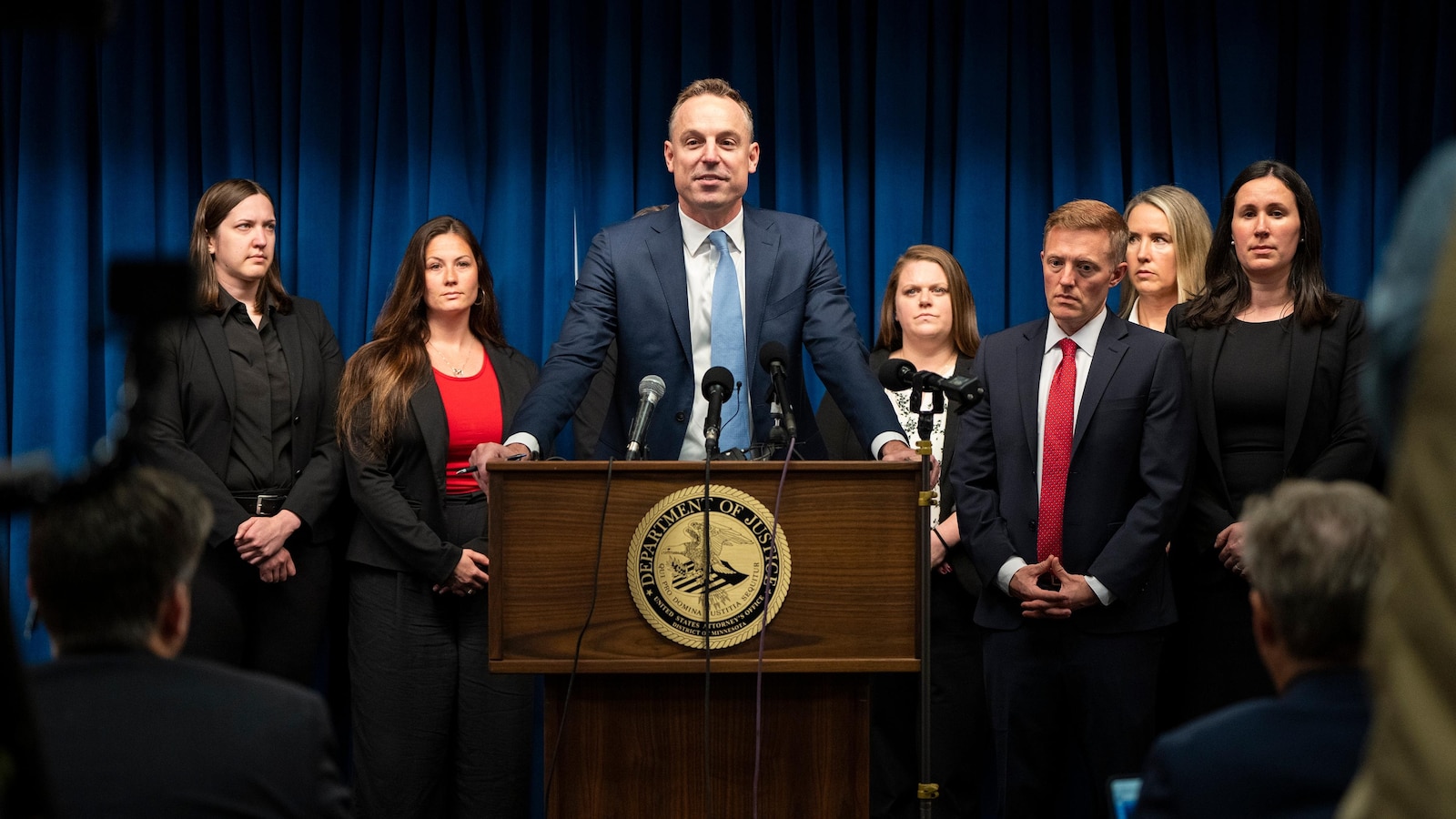
MINNEAPOLIS — Five people were charged on Wednesday with trying to bribe a juror in one of the country’s largest COVID-19-related fraud cases with a bag of $120,000 in cash, the U.S. Attorney’s Office and the FBI announced Wednesday.
The bribe attempt, which U.S. Attorney Andrew Luger called a “chilling attack on our justice system,” brought renewed attention to the trial of seven Minnesota defendants accused of coordinating to steal more than $40 million from a federal program that was supposed to feed children during the coronavirus pandemic. More than $250 million in federal funds were taken overall and only about $50 million has been recovered, authorities say.
Abdiaziz Shafii Farah, Abdimajid Mohamed Nur, Said Shafii Farah, Abdulkarim Shafii Farah and Ladan Mohamed Ali are each charged with one count of conspiracy to bribe a juror, one count of bribery of a juror and one count of corruptly influencing a juror, according to the indictment.
Abdiaziz Shafii Farah is also charged with one count of obstruction of justice.
Abdiaziz Shafii Farah and Abdimajid Mohamed Nur were among five convicted in the fraud trial earlier this month while Said Shafii Farah was acquitted. Abdulkarim Shafii Farah and Ladan Mohamed Ali were not involved.
At least three were expected to make their first court appearances Wednesday afternoon.
Investigators spent three weeks reviewing mountains of evidence to uncover a bribe plot Luger described as “something out of a mob movie.”
The five people charged attempted to win an acquittal not on the evidence, but “through an elaborate scheme to infiltrate this jury,” Luger said.
According to an FBI agent’s affidavit, a woman went to the home of “Juror #52” in the Minneapolis suburb of Spring Lake Park the night before the fraud case went to the jury in early June and delivered a gift bag with a “present” for the juror to a relative that answered the door.
“The woman told the relative to tell Juror #52 to say not guilty tomorrow and there would be more of that present tomorrow,” the agent wrote. “After the woman left, the relative looked in the gift bag and saw it contained a substantial amount of cash.”
The juror called police after she got home and gave them the bag, which held stacks of $100, $50 and $20 bills totaling around $120,000.
The woman who left the bag knew the juror’s first name, the agent said. Names of the jurors have not been made public, but the list of people with access to them included prosecutors, defense lawyers and the seven defendants.
After the bribe attempt was reported, the judge ordered all seven defendants to surrender their cellphones so that investigators could look for evidence. The judge also ordered all seven taken into custody and sequestered the jury. A second juror who was told about the bribe also was dismissed.
According to the indictment, the five targeted Juror 52 because she was the youngest juror and they believed her to be the only juror of color. They researched her address and personal information on social media. They surveilled the woman and tracked her daily habits, including following her home and purchasing a GPS tracking device to install on her car.
The group also drafted a “blueprint” for the juror that would provide instructions for persuading her fellow jurors. Those arguments were built around the juror’s identity, injecting the idea that prosecutors were motivated by racial animus: “(w)e are immigrants, they don’t respect us,” the list of proposed arguments read.
Ali is accused of being the woman who delivered the bribery money to the juror’s home. Luger said she was recruited by Nur, and flew in from Seattle to carry out the plot.
Seventy people have been charged in federal court for their alleged roles in the pandemic-related fraud scheme that prosecutors say centered on a nonprofit called Feeding Our Future. In addition to the five convictions in early June, eighteen other defendants have already pleaded guilty. Trials are still pending for the others.
Federal prosecutors say the conspiracy exploited rules that were kept lax so the economy wouldn’t crash during the pandemic. The FBI began digging into it in the spring of 2021. The defendants allegedly produced invoices for meals never served, ran shell companies, laundered money, indulged in passport fraud and accepted kickbacks.
The money came from the U.S. Department of Agriculture and was administered by the state, which funneled the funds through partners including Feeding Our Future. The Minnesota Legislature’s watchdog arm found that the state education department provided inadequate oversight of the federal program, which opened the door to the theft.
Five individuals have been charged by federal authorities for attempting to bribe a Minnesota juror with $120,000 in exchange for a favorable verdict in a high-profile case. The case has sparked outrage and raised concerns about the integrity of the justice system.
The individuals, who have not been named publicly, allegedly approached the juror during the trial and offered him the substantial sum of money in exchange for a not guilty verdict. The juror immediately reported the incident to the judge, who then alerted federal authorities.
Bribery of jurors is a serious offense that undermines the very foundation of our legal system. Jurors are supposed to be impartial and make decisions based on the evidence presented in court, not on financial incentives. When individuals attempt to manipulate the outcome of a trial through bribery, it erodes public trust in the justice system and compromises the integrity of the verdict.
The charges against the five individuals highlight the importance of upholding the principles of fairness and justice in our legal system. Bribery of jurors is not only illegal, but it also undermines the credibility of our courts and jeopardizes the rights of individuals to a fair trial.
It is crucial that federal authorities continue to investigate and prosecute cases of jury tampering and bribery to send a clear message that such actions will not be tolerated. The consequences of attempting to influence a juror with money should serve as a deterrent to others who may consider engaging in similar unethical behavior.
As this case unfolds, it is important for the public to remain vigilant and report any suspicious activity that may compromise the integrity of our legal system. By working together to uphold the principles of fairness and justice, we can ensure that our courts remain a beacon of truth and accountability for all.


